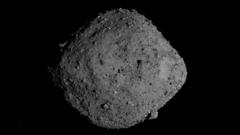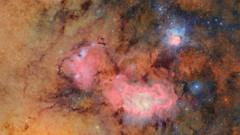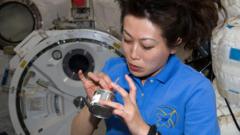Recent research has shown that samples collected from the asteroid Bennu contain a wide range of organic materials, including amino acids and nucleobases, raising intriguing questions about the origins of life both on our planet and potentially elsewhere in the Solar System.
Asteroid Bennu Reveals Building Blocks of Life, Say Scientists

Asteroid Bennu Reveals Building Blocks of Life, Say Scientists
Analysis of samples from the asteroid Bennu has unveiled essential organic compounds that could shape our understanding of life's origins on Earth and beyond.
In an exciting breakthrough, scientists have discovered essential chemical components of life in the dust from asteroid Bennu, challenging our understanding of cosmic life-sustaining materials. This analysis stems from samples collected by NASA's Osiris-Rex spacecraft, which successfully returned to Earth in 2023. The asteroid, measuring 500 meters wide, has been confirmed to harbor a wealth of organic compounds, including 14 of the 20 amino acids vital for forming proteins and the four nucleobases that constitute DNA: adenine, guanine, cytosine, and thymine.
While the discovery does not imply that Bennu ever supported life, it bolsters the hypothesis that primordial asteroids, like Bennu, may have played a crucial role in delivering essential organic materials to Earth during its formative years. "What we've learned from it is amazing," said Prof. Sara Russell, a cosmic mineralogist at the Natural History Museum in London. "It enables us to answer huge questions about where life began."
The Osiris-Rex mission involved a sophisticated operation where a robotic arm collected approximately 120 grams of black dust from Bennu's surface, offering scientists across the globe an unprecedented opportunity to analyze asteroid materials. Although the quantity may seem insignificant, researchers describe the samples as a treasure trove of information.
Alongside amino acids, the analysis indicated that the asteroid is rich in nitrogen and carbon compounds, along with evidence hinting at past water presence. Additionally, ammonia was detected—crucial for biochemical processes. Experts emphasized that while some of these findings align with materials found in meteorites that have already landed on Earth, others show a unique combination that has never been detected before.
"The early Solar System was turbulent, filled with millions of asteroids like Bennu that likely bombarded young Earth, providing the necessary ingredients for oceans and life," explained Dr. Ashley King from the Natural History Museum. He acknowledged that while Earth is the only known planet to harbor life, the potential for discovering similar conditions elsewhere in the Solar System remains a tantalizing possibility.
The insights gathered from Bennu's samples are just the beginning, as researchers look ahead to decades of study to piece together the cosmic narrative of our origins and explore other celestial bodies in our cosmic neighborhood. As these discoveries unfold, parents and scientists alike remain hopeful about answering profound questions pertaining to life's existence beyond Earth.
### References
1. Nature: Abundant ammonia and nitrogen-rich soluble organic matter in samples from asteroid
2. Nature: An evaporite sequence from ancient brine recorded in Bennu samples
Keywords: Chemistry, Science, Asteroids, NASA, Space exploration
While the discovery does not imply that Bennu ever supported life, it bolsters the hypothesis that primordial asteroids, like Bennu, may have played a crucial role in delivering essential organic materials to Earth during its formative years. "What we've learned from it is amazing," said Prof. Sara Russell, a cosmic mineralogist at the Natural History Museum in London. "It enables us to answer huge questions about where life began."
The Osiris-Rex mission involved a sophisticated operation where a robotic arm collected approximately 120 grams of black dust from Bennu's surface, offering scientists across the globe an unprecedented opportunity to analyze asteroid materials. Although the quantity may seem insignificant, researchers describe the samples as a treasure trove of information.
Alongside amino acids, the analysis indicated that the asteroid is rich in nitrogen and carbon compounds, along with evidence hinting at past water presence. Additionally, ammonia was detected—crucial for biochemical processes. Experts emphasized that while some of these findings align with materials found in meteorites that have already landed on Earth, others show a unique combination that has never been detected before.
"The early Solar System was turbulent, filled with millions of asteroids like Bennu that likely bombarded young Earth, providing the necessary ingredients for oceans and life," explained Dr. Ashley King from the Natural History Museum. He acknowledged that while Earth is the only known planet to harbor life, the potential for discovering similar conditions elsewhere in the Solar System remains a tantalizing possibility.
The insights gathered from Bennu's samples are just the beginning, as researchers look ahead to decades of study to piece together the cosmic narrative of our origins and explore other celestial bodies in our cosmic neighborhood. As these discoveries unfold, parents and scientists alike remain hopeful about answering profound questions pertaining to life's existence beyond Earth.
### References
1. Nature: Abundant ammonia and nitrogen-rich soluble organic matter in samples from asteroid
2. Nature: An evaporite sequence from ancient brine recorded in Bennu samples
Keywords: Chemistry, Science, Asteroids, NASA, Space exploration


















